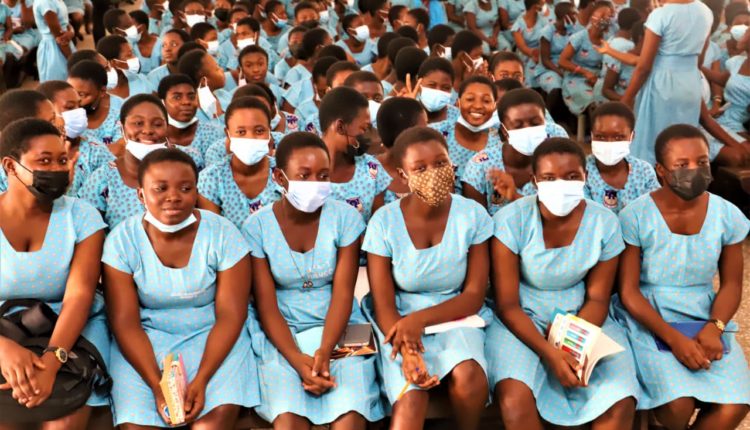The Ministry of Communications and Digitalisation (MoCD) in collaboration with the Ministry of Education and Huawei Technologies, Ghana has educated Female Senior High Schools in the Ashanti Region on Cyber Security as part of the Ministry’s Girls-in-ICT Program.
The pilot programme covers two other regions- Eastern and Central regions.
About 20,000 girls will benefit from the training in each region which will focus on the Cyber Security Act 2020.
The programme is aimed at providing ICT education to girls in the second cycle Institutions as well as equip them with basic cyber security fundamentals to help them stay safe in the cyber space.
The beneficiary schools include Wesley Girls Senior High School (SHS) and the Yaa Asantewaa Senior High School, St Louis, Serwaa Nyarko, Kumasi Girls, the Adventist Girls SHS, St Mary’s Girls, Afua Kobi Ampem Girls, St Monica’s, TI Ahmadiya and Prince of Peace.
Topics being treated include the Child Online Protection Provisions in the New Cyber Security Act 2020 and the SMART Acronym which explains how to stay safe online.
The girls are also being trained on risk associated with the use of internet which include fake news; cyber bullying, sextortion, cyber stalking among others.
On the Cyber Security Point of Contact, the girls would be sensitized to the need to report all cyber related issues confronting them to the National Cyber Security Authority on short code 292 for prompt response and necessary assistance.
According to the Minister for Communications and Digitalisation, Mrs Ursula Owusu-Ekuful initiative was part of efforts to continue empowering the youth with the digital skills they urgently need to thrive in the new technological era.
She expressed the hope that much enthusiasm would be generated amongst girls to enhance ICT education in the country.
In the Eastern Region, schools to benefit from the training are Mamfe Methodist Girls, Aburi Girls, Krobo Girls, Diaspora Girls, St Roses, Islamic Girls and St Mary’s Vocational and Technical Institute.
Holy Child, Wesley Girls and Mfantseman Girls in the Central Region will also benefit from the programme.
Female colleges of Education in the selected regions will also benefit from the training.
The Girls-in-ICT is an initiative of the International telecommunications Union (ITU), aimed at introducing young girls to basic ICT skills.
Good Strides
The introduction of the initiative has made several good strides, exposing young girls who may have found themselves at wrong side of life to the use of computer, ICT knowledge among other things.
Beneficiaries of the initiative in Sefwi Wiawso in the Western North Region have expressed happiness with the introduction of the program.
Under the Girls-in-ICT project, nine (9) districts in Western North and Prestea Huni Valley have been selected to present 1000 girls to be trained in Basic Computer Skills, Fundamentals of Programming, Scratch and HTML.
“We have not seen a computer before, we were even scared to touch it when we first got to the centre” a beneficiary told the Sector Minister, Mrs Ursula Owusu-Ekuful when she toured the Girls-in-ICT training centres.
Support
Telecommunication Giant, MTN Ghana months ago supported the initiative with GHC 10 million.
The support, according to the Chief Corporate Services Officer of MTN, Mr. Samuel Koranteng, is to help grow female participation in the ICT industry as part of the company’s 25th Anniversary.
Receiving the support, the Minister, Mrs. Ursula Owusu Ekuful noted how men have dominated the technology industry hence the need to bridge the gap.
According to her, there are untapped opportunities in the ICT industry and Ghana needs to prepare its human resources to embrace such.
“Ghana has what it takes to compete globally hence my conviction to grow girls in ICT to take advantage of the openings in the world.
“I have received several requests from boys who feel left behind in this initiative and want to be considered. But the priority now is to bridge the male-female gap and once we are even on the playing field, we may consider; children in ICT,” she said.
Mrs. Ekuful recounted her conviction to scale up the Girls in ICT initiative but for financing barriers, such remains a dream.
She, therefore, thanked MTN GHANA for favorably considering the ministry’s request and pledged to utilize the support for which it was given.
Lack of Girls in ICT narrowing development
Mrs. Ursula Owusu weeks ago speaking at the 75th Anniversary of the St Monica’s Old Students Association (SMOSA) said, the gross underrepresentation of girls in Science Technology Engineering and Mathematics (STEM) disciplines is not just an educational challenge but a developmental concern which needs to be addressed if we are to harness the benefits technology offers citizens.
The lawmaker made particular reference to a 2017, UNESCO report in 2017 titled “Cracking the code: Girls’ and women’s education in STEM”, which estimated that only 35% of STEM students in higher education globally are women, and differences are observed within STEM disciplines and specific countries.
“The picture is even more worrying when it comes to information and communication technologies. It is estimated that only 3% of female students in higher education opt for information and communication technologies (ICT) studies which also means women make up just a fraction of the workforce in these STEM related fields. It is also estimated that women hold just 24% of all jobs in the digital economy as at 2018 and the statistics have not changed” she said.
She stressed the need to bridge the digital gender disparity especially in the era where technology drives everything and STEM careers are the jobs of the future, driving innovation, social wellbeing, inclusive growth and sustainable development.
“Nation building requires the contribution of all, and technology is the key driver of growth and economic and social transformation in the recent history of the world. The COVID pandemic has taught us that. Even though we see prospects, the digital revolution is revealing an underrepresentation of women in terms of contributing to this transformation” she noted.




Comments are closed.